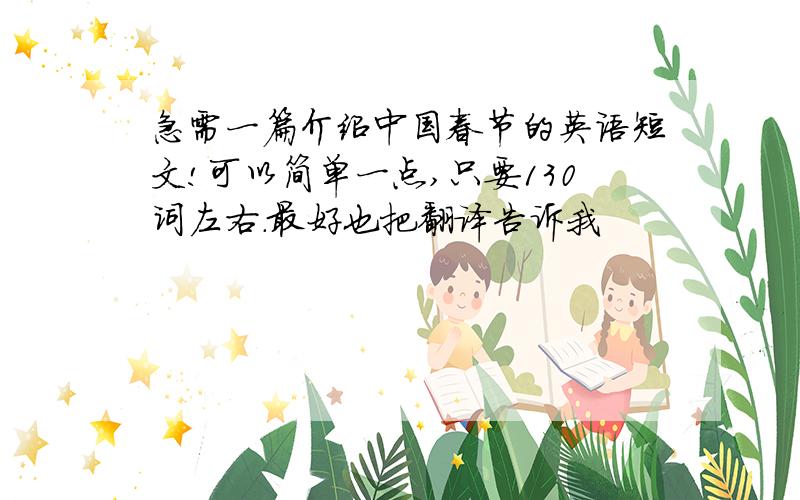急需一篇介绍中国春节的英语短文!可以简单一点,只要130词左右.最好也把翻译告诉我
来源:学生作业帮助网 编辑:作业帮 时间:2024/04/29 10:27:09

急需一篇介绍中国春节的英语短文!可以简单一点,只要130词左右.最好也把翻译告诉我
急需一篇介绍中国春节的英语短文!
可以简单一点,只要130词左右.
最好也把翻译告诉我
急需一篇介绍中国春节的英语短文!可以简单一点,只要130词左右.最好也把翻译告诉我
The oldest and most important festival in China is the Spring Festival.That day all family members get together,more commonly known in the West as Chinese New Year.
The Chinese New Year is now popularly known as the Spring Festival because it starts from the Begining of Spring.The date of the holiday varies from late January to mid February.
The Spring festival celebrates the earth coming back to life,and the start of ploughing and sowing.In the past,feudal rulers of dynasties placed great importance on this occasion,and ceremonies to usher in the season were performed.
Preparations for the New Year festival start during the last few days of the last moon.Houses are thoroughly cleaned,debts repaid,hair cut and new clothes bought.Doors are decorated with vertical scrolls of characters on red paper whose texts seek good luck and praise nature,this practice stemming from the hanging of peach-wood charms to keep away ghosts and evil spirits.
On New Year’s Eve houses are brightly lit and a large family dinner is served.In the south of China "nian gao" is served,while in the north the steamed dumpling "jiaozi" is popular.Most celebrating the festival stay up till midnight,when fireworks are lit,to drive away evil spirits.People often spend New Years day visiting neighbours,family and friends.
The public holiday for New Year lasts 3 days in China,but the festival traditionally lasts till the 15th day of the lunar month and ends with the ‘Lantern Festival’.
Chinese New Year, a.k.a. Spring Festival (Simplified Chinese: 春节; Traditional Chinese: 春节; pinyin: Chūn jié) or the Lunar New Year (Simplified Chinese: 农历新年; Traditional Chinese: 农历新年; pinyin: Nóng lì...
全部展开
Chinese New Year, a.k.a. Spring Festival (Simplified Chinese: 春节; Traditional Chinese: 春节; pinyin: Chūn jié) or the Lunar New Year (Simplified Chinese: 农历新年; Traditional Chinese: 农历新年; pinyin: Nóng lì xīn nián), is the most important of the traditional Chinese holidays. The festival proper begins on the first day of the first lunar month (Chinese: 正月; pinyin: zhēng yuè) in the Chinese calendar and ends on the 15th; this day is called Lantern Festival (Simplified Chinese: 元宵节; Traditional Chinese: 元宵节; pinyin: yuánxiāojié).
Chinese New Year's Eve is known as Chúxì (除夕). Chu literally means "change" and xi means "Eve".
Celebrated internationally in areas with large populations of ethnic Chinese, Chinese New Year is considered a major holiday for the Chinese and has had a strong influence on the new year celebrations of its neighbours. These include Koreans, Vietnamese, Mongolians, the Nepalese, the Bhutanese but no longer the Japanese since 1873.
In countries such as Singapore, Malaysia, The Philippines, Thailand, and other countries with significant Chinese populations, the Lunar New Year is also celebrated, largely by ethnic Chinese, but it is not part of the traditional cultures of these countries. In Thailand, for example, the true New Year celebration of the ethnic Thais is Songkran, which is totally different and is celebrated in April.
The period around Chinese New Year is also the time of the largest human migration, when migrant workers in China, as well as overseas Chinese around the world travel home to have reunion dinners with their families on Chinese New Year's eve. More interurban trips are taken in mainland China in this 40-day period than the total population of China.
翻译也要别人帮你,那要你还干什么?
不要太懒!
自己根据情况修改一下.
收起
Chinese New Year, a.k.a. Spring Festival (Simplified Chinese: 春节; Traditional Chinese: 春节; pinyin: Chūn jié) or the Lunar New Year (Simplified Chinese: 农历新年; Traditional Chinese: 农历新年; pinyin: Nóng lì...
全部展开
Chinese New Year, a.k.a. Spring Festival (Simplified Chinese: 春节; Traditional Chinese: 春节; pinyin: Chūn jié) or the Lunar New Year (Simplified Chinese: 农历新年; Traditional Chinese: 农历新年; pinyin: Nóng lì xīn nián), is the most important of the traditional Chinese holidays. The festival proper begins on the first day of the first lunar month (Chinese: 正月; pinyin: zhēng yuè) in the Chinese calendar and ends on the 15th; this day is called Lantern Festival (Simplified Chinese: 元宵节; Traditional Chinese: 元宵节; pinyin: yuánxiāojié).
Chinese New Year's Eve is known as Chúxì (除夕). Chu literally means "change" and xi means "Eve".
Celebrated internationally in areas with large populations of ethnic Chinese, Chinese New Year is considered a major holiday for the Chinese and has had a strong influence on the new year celebrations of its neighbours. These include Koreans, Vietnamese, Mongolians, the Nepalese, the Bhutanese but no longer the Japanese since 1873.
In countries such as Singapore, Malaysia, The Philippines, Thailand, and other countries with significant Chinese populations, the Lunar New Year is also celebrated, largely by ethnic Chinese, but it is not part of the traditional cultures of these countries. In Thailand, for example, the true New Year celebration of the ethnic Thais is Songkran, which is totally different and is celebrated in April.
The period around Chinese New Year is also the time of the largest human migration, when migrant workers in China, as well as overseas Chinese around the world travel home to have reunion dinners with their families on Chinese New Year's eve. More interurban trips are taken in mainland China in this 40-day period than the total population of China.
收起